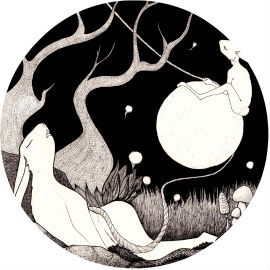Before the sun and night and the blue sea, I vow
To stand faithfully by all that is brave and beautiful;
To seek adventure and having discovered aught of wonder, or delight, of merriment or loveliness,
To share it freely with my comrades, the Band of Happy Rowers. [1]
I told my mother that I wanted to be an astronaut, but my mother was either hard of hearing, or I was an imperfect speaker. Either way, a few weeks after I declared my intention to travel to the stars, my mother told me that my membership package had arrived.
It was not what I’d expected. A booklet, an enamel pin bearing the image of Jason’s ship, (a trireme: unsuitable for travel to the stars), and a certificate bearing my new name: Atropos 3.
I took to reciting the pledge on the certificate daily, and to making my parents, their friends, and my friends (be honest, now: I didn’t have any friends. What friends can astronauts acquire, whose future is to sail among magellanic clouds, drifting for centuries in hypersleep only to wake, refreshed, circling an unknown planet in a ship filled with strangers?)
My grandmother, whose mother had been an astronaut, perhaps also hard of hearing (a family trait, it seems) sent me the shell of a paper nautilus when my next birthday–my tenth–rolled around (of course, birthdays do not roll: we, on our fragile rock, spin and cycle around a dying sun, celebrating each time the planet returns to the same point in its dance it transited on the day of our birth). The shell came framed in a shadow-box, with a label in my grandmother’s own crabbed hand: Argonauta argo.
For my eleventh it was the Argonauta nodosa.
My grandmother did not believe in astronauts, despite clear evidence of their existence in her own family line. She often complained bitterly of the allo-parent she had been given when her mother left for the Trappist system. She was more than forty years older, now, than her mother had been when she departed. Her mother, who is trapped in an ageless sleep, surrounded not by thorns and roses, but by a HypeSleep cloud of gases, and monitors, and machines. My great-grandmother, who travels encased in a second womb, which is itself encased in a flawless exo-sekeleton of steel. My grandmother died before my great-grandmotther will even dream of waking, on her sixteenth bio-birthday, a thousand years or more from now.
My mother said that my grandmother was crazy, and bitter as almonds. My great-grandmother was a hero. Would be a great hero: a mother of nations. She would see stars we had never seen. She would look back at us, she would see the light our sun had produced at some time in our future, arriving at the convex beauty of her young eye an unimaginable span of centuries from now. She would live to see a future in which we had spread out, like a virus, through the universe.
I said, again (ever persistent, ever hopeful), ‘Mother, I want to be an astronaut.’
And Mother said, ‘You were born too late, Atropos. The ships are gone. We sail on this ship now,’ (she dug her spade into the earth, turning soil, planting seeds). ‘We circumnavigate our star, that is all the star travel you will take. Some day you will cut the rope and see your daughter sail, though. Three generations for the earth, one for the stars, you know that’s how it is. How it must be. Some must sail, and some must stay to work the earth, to build the ships …’ (her thumb in the earth, making holes into which she dropped the beans) ‘We must each hope and work and love, must form and twist and measure and cut the threads that join us, one generation to another. That is the way to the stars.’
My daughter is a Fourth; will sail. Will sail forth (oh, the old jokes can still me make me groan). On the eve of her sixteenth birthday I will give her my enamel pin, and my argonaut shells, and she will leave me her daughter to raise, here, on this dying planet. My granddaughter and I (and perhaps, stars willing, my own mother, too) will watch the launch from a special viewing room high up in the cosmodrome.
I will sip champagne and feed my granddaughter strawberries and I, Atropos, the third and most terrible of the Fates, will cut the thread that symbolises our connection–daughter to daughter–with my abhorred shears.
[1] The Argonauts club was a membership club for children aged 7 to 17. It was linked to the Australian radio program of the same name, which was broadcast (with some changes of name, and station) from 1933 until 1972. New members of the Argonauts club received a lovely badge, a code name (the name of a ship, and a number), and a membership certificate with the Argonaut pledge printed on it.


No Comments